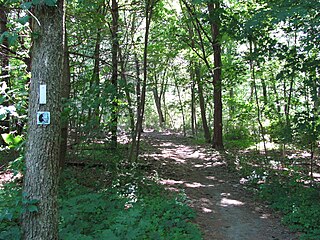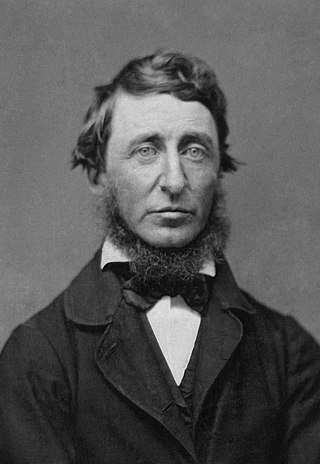
Henry David Thoreau was an American naturalist, essayist, poet, and philosopher. A leading transcendentalist, he is best known for his book Walden, a reflection upon simple living in natural surroundings, and his essay "Civil Disobedience", an argument for disobedience to an unjust state.

Concord is a town in Middlesex County, Massachusetts, in the United States. At the 2020 census, the town population was 18,491. The United States Census Bureau considers Concord part of Greater Boston. The town center is near where the confluence of the Sudbury and Assabet rivers forms the Concord River.
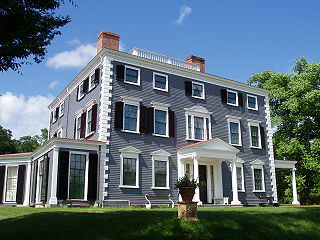
Lincoln is a town in Middlesex County, Massachusetts. The population was 7,014 according to the 2020 United States Census, including residents of Hanscom Air Force Base that live within town limits. The town, located in the MetroWest region of Boston's suburbs, has a rich colonial history and large amounts of public conservation land.
Transcendentalism is a philosophical, spiritual, and literary movement that developed in the late 1820s and 1830s in the New England region of the United States. A core belief is in the inherent goodness of people and nature, and while society and its institutions have corrupted the purity of the individual, people are at their best when truly "self-reliant" and independent. Transcendentalists saw divine experience inherent in the everyday, rather than believing in a distant heaven. Transcendentalists saw physical and spiritual phenomena as part of dynamic processes rather than discrete entities.

Walden is a book by American transcendentalist writer Henry David Thoreau. The text is a reflection upon the author's simple living in natural surroundings. The work is part personal declaration of independence, social experiment, voyage of spiritual discovery, satire, and—to some degree—a manual for self-reliance.
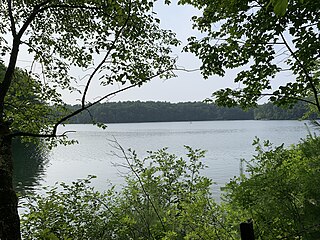
Walden Pond is a famous pond in Concord, Massachusetts, in the United States. A good example of a kettle hole, it was formed by retreating glaciers 10,000–12,000 years ago. The pond is protected as part of Walden Pond State Reservation, a 335-acre (136 ha) state park and recreation site managed by the Massachusetts Department of Conservation and Recreation. The reservation was designated a National Historic Landmark in 1962 for its association with the writer Henry David Thoreau (1817–1862), whose two years living in a cabin on its shore provided the foundation for his famous 1854 work, Walden; or, Life in the Woods. The National Historic Preservation Act of 1966 ensured federal support for the preservation of the pond.
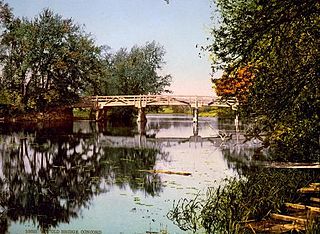
The Concord River is a 16.3-mile-long (26.2 km) tributary of the Merrimack River in eastern Massachusetts in the United States. The river drains a small rural and suburban region northwest of Boston. One of the most notable small rivers in U.S. history, it was the scene of an important early battle of the American Revolutionary War and was the subject of a 19th-century book by Henry David Thoreau.

My Side of the Mountain is a 1969 Panavision and Technicolor film adaptation of the 1959 novel of the same name, by Jean Craighead George. It was directed by James B. Clark.

The Henry Higginson House is a historic house located at 44 Baker Farm Road in Lincoln, Massachusetts.
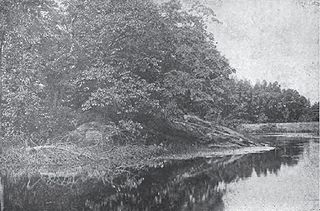
Egg Rock is an outcrop of Silurian Straw Hollow Diorite at the confluence of the Assabet and Sudbury rivers, where they form the Concord River in Concord, Massachusetts. The outcrop is located on a roughly oval intermittent island of about 100 by 50 meters. Egg Rock is usually accessible using foot trails over land, but during high river levels the island is separated from the mainland by a narrow channel. The highest point of Egg Rock is about 39 meters above mean sea level and about 6 meters above normal river level.

Stony Brook is a stream largely running through Lincoln and Weston, Massachusetts, then forming the Weston/Waltham boundary, and emptying into the Charles River across from the Waltham/Newton boundary. It has two tributaries, Cherry Brook and Hobbs Brook, and its watershed includes about half of Lincoln and Weston as well as parts of Lexington and Waltham. Since 1887, it has been the water supply for Cambridge, along with the Hobbs Brook Reservoir.

Fairyland Pond is a pond within Hapgood Wright Town Forest, a conservation area in Concord, Massachusetts. It is a popular recreation area, notable for its old-growth forest and its association with many literary figures from Concord’s past.

Fairhaven Bay is a lake located within the Sudbury river in Concord, Massachusetts, United States (US). It was frequented by Henry David Thoreau who, together with Edward Hoar, accidentally set fire to the woods near the bay in April 1844, as later described in Thoreau's journal.
The Walden Woods Project (WWP) is a nonprofit organization located in Lincoln, Massachusetts, devoted to the legacy of Henry David Thoreau and the preservation of Walden Woods, the forest around Walden Pond that spans Lincoln and Concord, Massachusetts. It was founded in 1990 by musician Don Henley to prevent two development projects in Walden Woods. Its mission has since expanded from conservation to research and education on the works of Henry David Thoreau. In 1998, the Thoreau Institute at Walden Woods was founded as part of the Project; today its library houses a collection of Thoreau-related resources.
Roland Wells Robbins (1908–1987) was an American archaeologist, author, and historian who is known for discovering the site of Henry David Thoreau's house at Walden Pond. His other discoveries include the Saugus Iron Works and the John and Priscilla Alden Family Sites.

Summer Hill is a 351-foot (107 m) hill overlooking the Assabet River in Maynard, Massachusetts "with a gradual slope to the north and west". Today the hill is largely conservation land with 24 acres of public hiking trails, and the summit of hill also contains a radio tower and the town's steel and concrete water tanks. It is the highest point in Maynard.

Mount Misery is a 284-foot hill and public conservation land in Lincoln, Massachusetts, on Route 117 and on the Bay Circuit Trail near the Sudbury River. Containing 227 acres (92 ha), Mount Misery is the largest piece of conservation land in the town and contains seven miles of public hiking trails through hills, wetlands and agricultural fields.

Mill Brook is a watercourse, about 3 miles (4.8 km) long, in Massachusetts, United States. It is sourced from Flints Pond in Lincoln, Massachusetts, and empties into the Concord River, to the southwest of Old North Bridge in Concord.
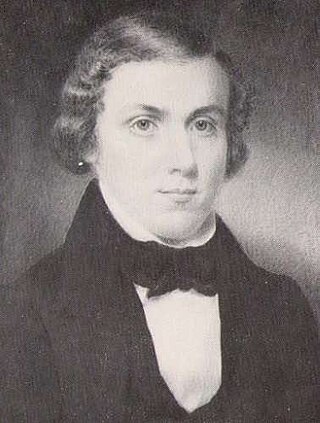
Charles Stearns Wheeler was an American farmer and Transcendentalist pioneer. He is known as being one of the inspirations for Walden, the book published by his friend Henry David Thoreau in 1854.










